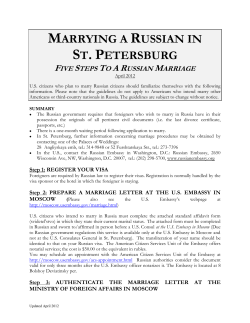
Russian‐Speaking Students
Russian‐Speaking Students For the most Americans, all people from the Former Soviet Union are considered Russians. People don’t know that the Soviet Union is composed of people from many different ethnic and cultural backgrounds. Only some of the many different ethnic groups from the Soviet Union can be considered Russian. The vast majority of the refugees from the former Soviet Union that live in Portland Metro area came from Russia and Ukraine. The Russian Federation, now an independent country, was formerly the Russian republic of the Soviet Union. Russia has an area of 6,591,100 square miles (17,075,400 sq. km),roughly twice the size of the United States and extends from the Baltic Sea in the west to the Pacific Ocean in the east, a distance of 4, 970 miles, covering 11 time zones. From its claimed territorial limit in the Arctic Ocean to its southernmost point, the country extends 2, 480 miles (4,000 km). Demographers estimated the population at 140 million. Close to 123 million of the total area ethnic Russians; other large ethnic groups include Ukrainian, Tatars, Chuvash, Bashkirs, and Mordovians. Ukraine (meaning: The Borderland) is located in Eastern Europe and is surrounded by Moldova, Romania, Hungary, Slovakia, Poland, Belarus, Russia, and the Black Sea. Because of its strategic position, Ukraine has long been considered a crossroad between Europe and Asia. With a total land area of 603,700 square kilometers (slightly smaller than Texas), this former Soviet republic is Europe’s second largest country. The capital is Kiev with 2.8 million residents. Ukrainian is a Slavic language, which is taught and spoken throughout the country. Russian is also widely used within the major cities and eastern oblasts (counties). Population: 46 million (2008 estimate) Ethnicity: Ukrainian 73%, Russian 22%, Jewish 1% According to the Office of Refugee Resettlement, Oregon, although the 29th largest state by population, is 11th largest in refugee acceptance. While prior to 1988 the majority of refugees were from South East Asia, since that time, 55% of all refugees to Oregon Have come from the former USSR. Over 90% of the ex‐Soviet refugees are families, and the vast majority coming in today are relatives of previous refugees. Approximately 90% of Oregon’s refugees from former USSR are Evangelical Christians (Pentecostal, Baptist and Seventh Day Adventists). Unlike many refugee populations, this group contains a fairly high proportion of the elderly. Also, approximately 1/3 of this population is under 21. Despite the growing numbers, there is no "Russia town" in Portland, or even a distinct Russian neighborhood. There are many Russian businesses in Southeast Portland, on Foster Road and Division Street, Jewish families live in the Southwest, evangelical families and churches stretch from Milwaukie to Troutdale. Vadim Riskin, 02/2009 PPS students from the former Soviet Union speak a variety of Slavic languages. However, most also speak Russian. In Portland Metro Area, these students are primarily evangelical Christian or Jewish, two groups that were notoriously out of favor with the Soviet government, and treated accordingly. The Soviet school system focused on memorization, and was based on a stern instructional method, and high obedience expectations. The homework load was heavy, even for the youngest children. The schools day in Russia is formal and very structured, even for young children. Tips for teachers: • The most successful educators working with Russian speakers are those who speak some Russian or say even a few friendly words in Russian. • Non‐Russian speaking American teachers working with large numbers of Russian‐speaking students should at least become familiar with the Cyrillic alphabet. • Church is not surprisingly the center of the community with services several times a week, with specific services/study groups for women, youth, etc. The pastor is quite influential and very respected. The family is a source of great stability among Russian‐speaking immigrants. The children are expected to be very respectful and to care for their elders. Elders are expected to raise their grandchildren if the parents are both working. Elders are shown respect by the use of titles such as Mr., Mrs., Uncle, or Aunt when addressing them. Body language is important. Russian‐speaking use broad hand and facial expressions to convey ideas and emotions. Physical contact by Russian‐speaking – touching another person – is a sign that things are going well. Straight talk is appreciated, even when it leads to disagreement. Watch out for double negatives. In Russian, the more negatives you use the more negative the meaning. • • • • • • • • Once you are accepted, the Russian‐speaking people are extremely friendly, warm and giving. Vadim Riskin, 02/2009 Local Resources: • Immigrant and Refugee Community Organization (IRCO) ‐ www.irco.org • Russian Oregon Social Services (ROSS) ‐ www.emoregon.org/ross.php • Portland Impact ‐ www.portlandimpact.org • Southeast Works ‐ http://www.seworks.org • Lutheran Community Services Northwest ‐ www.lcsnw.org References: • Dr. Catherine Collier. Background Information on Russian‐Speaking Children in America, 1998 • www.geog.ucsb.edu • www.onlyoneson.org/ukraineff Vadim Riskin, 02/2009
© Copyright 2025





















